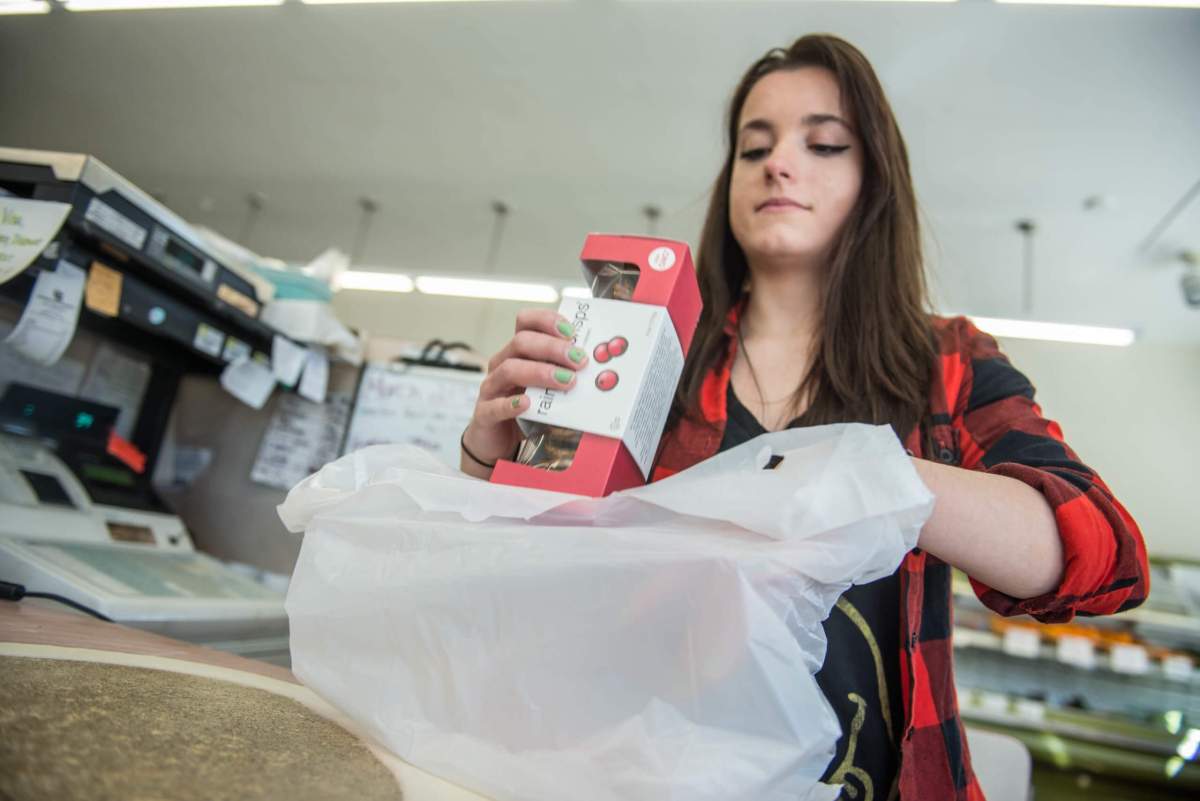Soon, Cambridge shoppers’ routines of taking home groceries in petroleum-based products will float away like a plastic bag in the wind.
The city on Thursday, March 31 will join three other Massachusetts communities when a ban takes effect eliminating plastic bags with handles at grocery stores, pharmacies and other shops.
Customers instead will have to bring their own reusable bags or choose paper at a charge of 10 cents per bag, according to an ordinance the city passed in March of 2015. Stores have been prepping for the change over the past few months – and hearing a blend of understanding and outrage from customers.
“I think everybody has mixed emotions about it,” said Diana Cerretani, who owns and manages the Evergood Super Market on Massachusetts Avenue. “Some people don’t care. Other people are up in arms about it. They’re not crazy about having to spend a dime to buy a bag when they’ve never had to before.” RELATED: Police locate driver who struck senior in Cambridge hit-and-run She said she stopped ordering plastic bags months ago but still picks up smaller packages of the products at local distributors. Finding enough stock of reusable bags has been a challenge, she said, adding that she’s still looking for a sturdy, cheap product to offer at the checkout line. Another obstacle, Cerretani said: convincing customers to lug groceries home in paper during inclement weather. Paper gets soggy and rips in the rain – plastic doesn’t.
“But you know, it is what it is,” she said. “A lot of people don’t like change but everybody will eventually get used to it.”
Breaching the new “Bring Your Own Bag Ordinance,” enforced by the Department of Public Works, could lead to a $300 fine.
But Michael Orr, the DPW’s bag ban program director, said the city doesn’t expect to have to crack down.
“We’re not looking to be punitive,” Orr told Metro. “We’re working to try to make sure they understand the ordinance and that they understand the benefits for them and for the customer and for the environment.” RELATED: Mayor Walsh signs Boston City Council’s puppy mill bill The city has been advertising the change by distributing fliers, stickers at cash registers and posters on sandwich boards in busy city squares.
Advocates and city officials have said the ban would reduce non-biodegradable litter and cut down on plastic in waterways, while also driving down demand for fossil fuels.
The ordinance allows store owners to apply for exemptions while they deplete their stock of bags. The DPW granted about two-dozen such exemptions, mostly to small businesses with a few months worth of bags still remaining in storage, Orr said. “A few plastic bags will still be floating around Cambridge,” he said.
The city has also set aside 10,000 reusable bags to be distributed for free to seniors public housing facilities.
When it takes effect, Cambridge will be the largest city with a plastic bag ban on the East Coast.
It could also influence bans in other communities, or ideally a statewide ban, Vice Mayor Marc McGovern said – just as Cambridge led the way in banning smoking in restaurants and raising the minimum age to buy cigarettes. “We’ll see how our program goes. … I’m not saying we’re necessarily the model people should follow at this point, but we think we did a good job on this,” McGovern said. “If it’s really going to help the environment in the way we hope it does, it’s going to take every community to do it.” Plastic containers and wrappers for meats and produce will still be legal, as will plastic bags for laundry and newspapers.
Newton, Brookline and Manchester-by-the-Sea already have plastic bag bans.
At Harvest Co-Op Markets, which is also on Mass. Ave., customers looking for plastic bags have been out of luck for a while now.
RELATED: State senate report urges caution on legalizing marijuana Assistant Manager Michael Johnson said the store gave out the last of its stock in October.
Management also got ahead of the ban by putting up signs, talking customers through the change and offering discount Harvest-branded reusable bags: at 99 cents rather than the usual $1.99.
“Absolutely people were upset,” Johnson said. “The common grievances were not having plastic bags for kitty litter, not having plastic bags for when it rains.”
But the shift is about being more eco-friendly, which is a message that does resonate for most customers, Johnson said.
“We try to be as understanding as possible. We try to say, ‘We apologize for the inconvenience, but we’re hoping that in the long run it will work to the benefit of all of us in the future.’”
Outrage and understanding as Cambridge prepares for ban on plastic bags

Derek Kouyoumjian/Metro


















